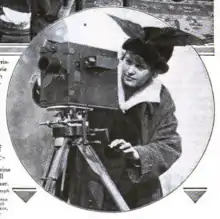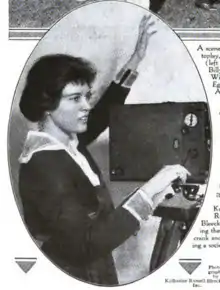Katherine Russell Bleecker
Katherine Russell Bleecker (May 5, 1893 — February 1, 1996), later in life Katherine Bleecker Meigs and later still Katherine B. Jobson, was an American filmmaker in the silent era. She is sometimes credited as the first professional camerawoman in American film.


Early life
Katherine Russell Bleecker was born in New York, the daughter of Russell Bleecker and Emily Fisk Blunt Bleecker.[1]
Career in filmmaking
Katherine Bleecker was a pioneering professional camerawoman,[2] who used her own personal camera equipment.[3] She made three documentary films for the Joint Committee on Prison Reform, on location at New York state prisons,[4] Sing Sing, Auburn, and Great Meadow: A Day in Sing Sing (1915), A Prison Without Walls (1915), and Within Prison Walls (1915). The films were used in lectures about prison conditions and prison reform.[5]
"I've had a varied experience with my pictures," she explained. "I've been up in a flying machine, have taken from tugboats and automobiles, and always there are plenty of bystanders ready and eager to jump in and play mob or be shot."[6] In 1916 she directed "Man and Millionaire", a film scenario written for a contest in the Pittsburgh Press.[7][8] In 1918 she completed Madame Spy, a film starring Jack Mulhall, Wadsworth Harris, George Gebhardt and Claire Du Brey.[9] She also advertised her services as available for documenting "children and social events ... factories and machinery."[10] She filmed the 1918 Memorial Day parade in Nutley, New Jersey.[11]
She also made some of the first "society films," a novelty version of club theatricals,[12] with titles including The Perils of Society,[13] Skeins of Destiny, The Flame of Kapthur, The Smuggler's Revenge, Gloria, A Question of Fortune and A Romance by the Sea. Bleecker would create the film, with wealthy amateurs playing the roles for their friends' entertainment or for fundraising events.[1][12]
Bleecker was manager of a movie theatre in New York in 1918, when her predecessor went to war.[14] "I am going to prove that theater managing is like housekeeping – a woman's job", she quipped.[15] Also during World War I, she made films for the American Red Cross.[16]
Later life
Bleecker married businessman Willis Noel Meigs in 1918. They had a son Henry Meigs II (1921-2014), who became a judge,[17] and a daughter Elizabeth Bleecker Meigs Averell (1923-1957), who became a children's book author.[18] The Meigses divorced in 1939. As Katherine Bleecker Meigs, she started an etiquette advice service by telegraph, scheduling bouquet deliveries, and even providing chaperones by request.[19][20] She also lectured on etiquette at Hunter College in 1937 and 1938.[21] Katherine Bleecker Meigs was president of the New York League of Business and Professional Women in the 1930s.[22]
She remarried, to insurance executive Alfred Pears Jobson.[23] During World War II she organized radio broadcasts for child refugees to speak on the air to their parents abroad. In 1943, she was appointed chair of Vocational Services for the Civilian Activities Division of Army Emergency Relief, tasked with finding jobs for the wives and mothers of soldiers.[24] She was widowed when Jobson died in 1974.[25] Katherine Bleecker Jobson died in early 1996, aged 102 years. Her estate of over $2 million was donated to establish scholarships and the Alfred P. and Katherine B. Jobson Professorship at Centre College in Kentucky; her son Henry Meigs II was a trustee of the school.[26]
References
- Nanette Lincoln, "Society Goes in for the Films" Green Book Magazine (August 1916): 355-359.
- Jane Gaines, Michele Koerner, "Women as Camera Operators or 'Cranks'" Women Film Pioneers Project, Columbia University Libraries.
- Alexis Krasilovsky, Women Behind the Camera: Conversations with Camerawomen (Praeger 1997): xxi. ISBN 9780275957445
- "New York State Prisons in Movies" The Delinquent (October 1915): 9-11.
- Alison Griffiths, Carceral Fantasies: Cinema and Prison in Early Twentieth-Century America (Columbia University Press 2016): 240-244. ISBN 9780231541565
- "Prison Moving Pictures Taken by a Girl" New York Times (November 21, 1915): SM19. via Newspapers.com

- Brief news item, The Fourth Estate (August 5, 1916): 19.
- "Film For Press Movie Contest is Completed" Pittsburgh Press (August 20, 1916): 2. via Newspapers.com

- "'Madame Spy' on View" Dramatic Mirror of Motion Pictures and the Stage (January 12, 1918): 16.
- Katharine Russell Bleecker Film Service advertisement, Pittsburgh Press (August 14, 1916): 5. via Newspapers.com

- "Discover New Jersey: 1918 Nutley Memorial Day Parade". newjersey.news12.com. Retrieved 2019-02-03.
- "To Act Before the Camera is the Latest Fad of Society" The Sun (February 6, 1916): 31. via Newspapers.com

- Katherine Russell Bleecker, The Perils of Society: A Film Play (1916).
- "Broadway Has First Woman Manager" Oregon Daily Journal (January 17, 1918): 13. via Newspapers.com

- "These Women Pioneers Find Men's Shoes Just Fit Them!" Santa Cruz Evening News (January 7, 1918): 8. via Newspapers.com

- "Movies are Taken for the Red Cross" Wilkes-Barre Times Leader (January 15, 1917): 14. via Newspapers.com

- "Deaths: Henry Meigs II" The Courier-Journal (December 2, 2014): A9. via Newspapers.com

- Elizabeth Bleecker Meigs, The White Winter A Story of Scarlet Hill (Bobbs-Merrill 1948).
- "Stumped by Etiquette? Use the Telegraph" Milwaukee Sentinel (August 22, 1931): 22.
- "Social Leader Pioneers Job" Arizona Daily Star (September 2, 1931): 9. via Newspapers.com

- "Eat with Fingers to Do It Up Right" Washington Court House Record Herald (January 19, 1938): 4. via Newspapers.com

- "New York B. P. W." Brooklyn Daily Eagle (June 5, 1938): 20. via Newspapers.com

- "Mrs. B. E. C. Hoffman, Willis Meigs, to Marry" New York Times (December 12, 1947): 42. via ProQuest
- "Job of Finding Work for Wives and Mothers Of Soldiers Taken Over by Mrs. A.P. Jobson" New York Times (June 11, 1943): 16. via ProQuest
- "Alfred P. Jobson" New York Times (March 25, 1974): 34. via ProQuest
- "Centre College Receives Bequest" Courier-Journal (July 22, 1996): 2. via Newspapers.com
